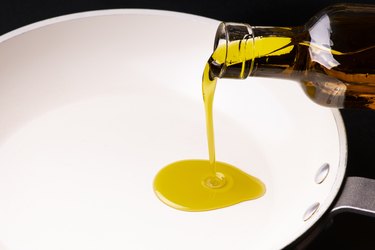
For decades, foods rich in fat were demonized. But that long-held myth has been debunked, and you can — and should — enjoy some fat. In fact, fat-dense, plant-based cooking oils are crucial to a heart-healthy diet. And if you have high blood pressure, they may even help lower your BP.
Video of the Day
Video of the Day
Healthy Fat Facts
While you shouldn't cut fat completely from your diet, you also should be conscious of the fat you're consuming, Seattle-based nutritionist and American Academy of Nutrition and Dietetics spokesperson Ginger Hultin, RDN, CSO, says. And that applies to your selection of cooking oils as well.
"Many oils rich in monounsaturated and polyunsaturated fats can help lower blood pressure when consumed as part of an overall low- or moderate-fat dietary pattern," Hultin says. "Having the right amount of healthy fat in your diet can promote heart health, and unsaturated fats can even help reduce your blood pressure when consumed in the right quantities in an overall balanced dietary pattern."
The American Heart Association (AHA) adds that one way you can swap out less healthy fats (like saturated and trans fats) with good-for-you fats (like monounsaturated and polyunsaturated) is to incorporate healthful nontropical vegetable oils into your diet.
The Best Oils for High Blood Pressure
The trick to implementing cooking oils for your heart health is in the choosing — and portion. Good sources of monounsaturated fat include canola, corn, olive, peanut, safflower, soybean and sunflower oils and cooking sprays, the AHA says. Blends of these oils (aka vegetable oils) are also a healthy choice — as long as they have less than 4 grams of saturated fat per tablespoon and zero trans fats or partially hydrogenated oils.
And, despite being harder to find on your grocer's shelf — and potentially more costly — oils like avocado, rice bran, sesame and grapeseed are also heart-healthy choices, the AHA says.
In fact, a blend of unsaturated fat- and antioxidant-rich sesame oil with rice bran oil may have an anti-hypertensive effect. A 60-day study in New Delhi published in the March-April 2016 issue of the Journal of Clinical Lipidology found that for people with mild to moderate hypertension, reduction in blood pressure and improved cholesterol levels were found in those who used a sesame and rice bran cooking oil blend alone or in combination with their blood pressure medication.
Another more accessible staple to have on hand for heart health is extra virgin olive oil (EVOO). EVOO is one of the best oils for heart health, Cleveland Clinic nutritionist Julia Zumpano, RD, LD, says. It packs the most antioxidants of the olive oil varietals, the Cleveland Clinic says, which comes as a result of the olives having been cold-pressed within 24 hours of picking.
There’s an Oil for That
If you're ready to up your cooking oil use in a heart-healthy way, there are many creative ways to implement them across all methods of cooking, like pan-frying, stir-frying, sauteing and baking. The one method you should skip? Deep-frying. The Cleveland Clinic recommends you ditch deep-frying for healthier cooking methods.
You can also use oils in place of less heart-healthy solid cooking fats (like butter and margarine) when you're cooking or want to drizzle something on your food to add flavor. Plus, you can even incorporate healthy oils into your homemade dressings, dips, sauces and marinades, the AHA says.
But remember: Easy does it when it comes to cooking oils. "You don't need more than 1 to 4 tablespoons to see heart health benefits," Zumpano says. You want to use the smallest amount you can because it still all adds to your daily total fat intake.
Read more: What Is the Healthiest Cooking Oil for Deep Frying?
- Ginger Hultin, MS, RDN, CSO, nutritionist, Seattle; spokesperson, American Academy of Nutrition and Dietetics
- American Heart Association: “Healthy Cooking Oils”
- Journal of Clinical Lipidology: “A Blend of Sesame Oil and Rice Bran Oil Lowers Blood Pressure and Improves Lipid Profile in Mild-to-Moderate Hypertensive Patients”
- Julia Zumpano, RD, LD, Cleveland Clinic
- Cleveland Clinic: “Heart-Healthy Oils”
Is this an emergency? If you are experiencing serious medical symptoms, please see the National Library of Medicine’s list of signs you need emergency medical attention or call 911.